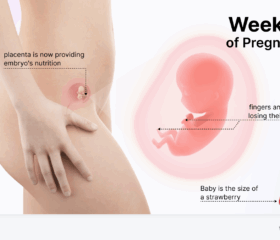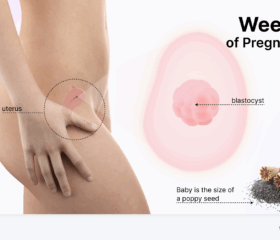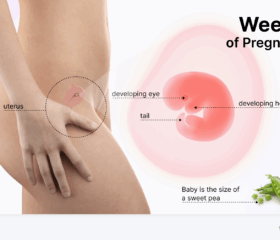Pregnancy Week by Week
20 Weeks Pregnant
Your baby is as big as a sweet potato.
6.46
inches
10.58
ounces
20 Weeks Pregnant: Symptoms, Signs, and Baby Development
Can you believe how the time has flown by? Your body has worked hard these past 20 weeks, but the work doesn’t stop now. As it grows and changes to accommodate your growing bundle of joy, you may notice new pregnancy symptoms appear.
Your baby is also busy developing, and she’s getting increasingly active. As you enter your 20th week, learn what’s going on with the both of you.
Your baby's development at 20 weeks
At 20 weeks, your baby is about the size of a sweet potato, measuring just under 6.5 inches long and weighing about 10 ounces. 12 She’s busy developing her:
- Taste buds: Your baby’s taste buds are now functional, and she’s swallowing amniotic fluid that contains traces of the food you eat. While it’s not certain whether she can really “taste” these flavors the way you do, studies suggest that your pregnancy diet could influence her food preferences later in life, so do your best to eat all your veggies. 3
- Muscles: Your baby’s muscles are growing rapidly, leading to stronger, more frequent movements. These motions, which you might feel as flutters or gentle kicks, will strengthen her muscles and improve her coordination.
- Sleep/wake cycles: Your baby is beginning to establish regular sleep/wake cycles, although they may not always align with yours. You might notice that she’s more active at certain times of the day, especially after you’ve eaten or in the evening.
- Fingerprints: Your baby’s fingerprints are also developing this week. As you probably know, no two people (not even identical twins!) have the same fingerprints.

Your body at 20 weeks
As your body adapts to your growing baby, you’ll probably notice changes of your own. Here’s what many women have to contend with at 20 weeks:
- Itchy skin: As your skin stretches, particularly around your belly and breasts, you may feel itchy. Moisturizing and using cold packs may alleviate your discomfort, but avoid scratching, which will only make it worse or cause excoriations (skin lesions).
- Hair and nails: As a result of your changing hormones, you might notice that your hair is thicker and your nails grow faster. 4 However, don’t be surprised if you experience some hair loss postpartum—it’s normal to lose the extra hair you gained during pregnancy.
- Vaginal discharge: It’s also normal for your vaginal discharge during pregnancy to increase. Healthy vaginal discharge is thin and clear or milky-white. Speak with your doctor if you have lumpy, green, or yellow discharge during pregnancy—or if your discharge has a foul odor. 5
- Swelling: Mild swelling, particularly in your feet and ankles, is normal. You may find that elevating your legs helps you manage your swollen feet during your pregnancy. Let your doctor know if your swelling is severe or sudden, as this is a warning sign of preeclampsia. This condition can be particularly dangerous if it’s not caught quickly.
- Linea nigra: You may notice a dark line running from your belly button down to your pelvis, called the linea nigra. This comes about due to your body producing extra melanin during pregnancy. Like most skin changes during this time, your linea nigra will usually fade within a few months of giving birth. 6
Soon, you may experience Braxton Hicks contractions
Be aware of Braxton Hicks contractions, which many women mistake for labor contractions. While these “practice” contractions can be uncomfortable, they don’t indicate labor. Contact your doctor if you experience regular contractions that don’t ease up with rest or if your contractions feel very painful instead of just a little uncomfortable.
You can use a contraction timer on a pregnancy tracker app to record the duration and frequency of your contractions so you can report the info to your doctor.
Your 20-week belly
At 20 weeks, your uterus has likely reached your belly button, making your bump much more rounded.
Your belly button changes during pregnancy, and it may flatten or even pop out as your uterus expands, turning from an innie to an outie. This is usually temporary, although it may feel a little sensitive or strange when clothes rub against it. Tell your doctor if you have pain in your belly button, as it could be a sign of an umbilical hernia. 7
Your doctor will start to measure your fundal height (the distance from your pubic bone to the top of your uterus) at this stage to track your baby’s growth and identify any concerns. This measurement should roughly correspond to your week of pregnancy (i.e., it should be around 20 centimeters at 20 weeks). 8
How much weight should you gain at 20 weeks?
At 20 weeks, it’s likely you’ve gained around 8–10 pounds already. 9
As a general rule, you should aim to gain about half a pound to 1 pound per week. However, how much weight you should put on depends on your pre-pregnancy body mass index (BMI), so talk to your doctor about what’s right for you. 10
Your symptoms at 20 weeks
Some of these symptoms may already be familiar, and some may be completely new. Here are some of the most common issues moms-to-be experience this week:
- Restless sleep: Many women have trouble sleeping, finding it challenging to get into a comfortable position.
- Constipation: Feeling backed up? Your hormonal changes, decreased activity levels, and the pressure from your growing uterus may cause constipation during your pregnancy. 11
- Leg cramps: If you haven’t already, you might experience cramping in your legs. Worst of all, these aches and pains often strike at night.
- Heartburn: Your digestive system may also feel the pressure of your growing baby, which can cause heartburn to start at this stage of pregnancy. 12
- Shortness of breath: With your uterus expanding, the extra pressure on your lungs might cause shortness of breath, especially if you are carrying twins. 13
- Lower back pain: The extra weight you’re carrying and the change in how that weight is distributed—combined with hormonal changes that loosen your ligaments—can bring about nasty lower back pain during your pregnancy. 14
Consider tracking your symptoms in a pregnancy app. The best pregnancy trackers also offer tips and other educational features to help you manage your symptoms.
You should also take a proactive approach to protecting you and your baby’s overall health by staying up-to-date on your vaccinations (you can get the flu shot while pregnant, and depending on your circumstances and overall health, you might need others, too).
How to manage your symptoms at 20 weeks
While reaching the halfway point of your pregnancy is a great reason to celebrate, it’s normal to feel frustrated by your symptoms. Fortunately, there are ways to alleviate your symptoms and look after yourself at 20 weeks:
Stay hydrated
Throughout your pregnancy, you’ll need to drink plenty of water. Aim to drink around 8–12 cups (64–96 oz) per day. 15 If you’re suffering from constipation, staying properly hydrated could alleviate it.
Get active
While you’ll need to get a lot of rest, you should also try to move a little bit. Regular exercise combats lower back pain and constipation and puts you in a good mood.
Gentle stretching is also a great way to relieve cramping. Note that while exercise is important, try not to overexert yourself.
Find a comfy way to sleep
If you’re having trouble sleeping, try lying on your side with a pillow between your knees and use additional pillows for support under your belly or behind your back.
Many doctors recommend sleeping on your side, preferably your left side, to reduce pressure on your major blood vessels. 16 Avoid sleeping on your back, which is one of the worst sleeping positions during pregnancy, as it restricts your blood flow.
If you’re finding it hard to stay comfortable in bed, consider buying a pregnancy pillow (or two) and experimenting with them to find a position that works for you.
Enjoy the bedroom
Some women experience an increased libido and better orgasms at 20 weeks, thanks to increased blood flow and added natural lubrication. If your doctor gives you the all-clear to have sex during pregnancy and you’re sexually active, enjoy it!
As with sleeping, you may need to experiment to find comfortable positions, since your changing body may temporarily make some of the ones you’re used to unworkable.
Look after your mental health
Pregnancy is a (mostly) joyous time, but it isn’t always smooth sailing. It’s perfectly normal to feel down some of the time, so take steps to care for your mental wellbeing.
If you find yourself stressing out or having trouble sleeping due to a racing mind, try journaling. As always, reach out to your partner, family, friends, or a therapist if you need.
Treat yourself
You’ve done great making it to your 20th week, so celebrate this milestone with something you enjoy, whether it’s a prenatal massage or a facial. On that note, prenatal massages can be particularly helpful for lower back pain, too.
Treating yourself doesn’t have to break the bank; if you’re on a budget, consider getting a new book from the library, going for a walk in nature, or just taking a relaxing bath.
What to prepare at 20 weeks
Now that you’re at the halfway point, the prospect of meeting your little bundle of joy may feel more real than ever! Moreover, your energy levels may be higher now than they were in the first trimester, so use this boost of energy to get things done in advance of your third trimester.
Here’s what you should try to prepare as you go into week 20.
Look for a pediatrician
If you haven’t already, start looking for a pediatrician for your baby. Get recommendations from friends, family, or your obstetrician-gynecologist (OB-GYN). Check that they’re covered by your insurance and are in a convenient location, and above all, make sure you trust and connect with them—they’ll be with you throughout your baby’s childhood, after all.
Get your mid-pregnancy ultrasound
Between weeks 18 and 22 is when you’ll have your mid-pregnancy ultrasound. This detailed scan allows you to see your baby’s developing organs and gives you the much-needed peace of mind that everything is progressing as normal.
This pregnancy ultrasound, also called an anatomy or gender scan, can also reveal another huge detail: your baby’s sex! If you’d like to know, now’s when you find out your baby’s gender. If you prefer for it to be a surprise, that’s fine, too. Just tell the sonographer (the ultrasound technician) what you prefer.
Decide where to give birth
You’ll also need to prepare for the big day when you deliver your baby. Pick a place that feels right for you. Try to schedule tours of the maternity wards at local hospitals to make sure you feel comfortable there.
If you’d prefer to give birth at home, start researching midwives and discuss your options with your OB.
Final thoughts
Welcome to the halfway point of your pregnancy! Only four more months to go until you finally meet your little one.
It hasn’t been an easy ride, but you’ve gotten through it like a champ. As you go into the last half of your pregnancy, relish the extra energy you (hopefully) have. Of course, if you’re concerned about anything, have any strange new symptoms popping up, or just need a little reassurance, your doctor is always there.
Article Sources
- Baby Your Baby. "Fetal Growth Chart" Retrieved June 24, 2025.
- National Health Service. "Week 20" Retrieved June 24, 2025.
- Food Quality and Preference. "Development of food preferences: Lessons learned from longitudinal and experimental studies" Retrieved June 24, 2025.
- Nemours KidsHealth. "10 Things That Might Surprise You About Being Pregnant" Retrieved June 24, 2025.
- Tommy’s. "Discharge in pregnancy" Retrieved June 24, 2025.
- MedlinePlus. "Skin and hair changes during pregnancy" Retrieved June 24, 2025.
- The University of Texas Southwestern Medical Center. "Why belly button pain during pregnancy is still a mystery" Retrieved June 24, 2025.
- Cleveland Clinic. "Fundal Height" Retrieved June 24, 2025.
- American Pregnancy Association. "20 Weeks Pregnant" Retrieved June 24, 2025.
- American College of Obstetricians and Gynecologists. "How much weight should I gain during pregnancy?" Retrieved June 24, 2025.
- Cleveland Clinic. "Pregnancy Constipation" Retrieved June 24, 2025.
- Johns Hopkins Medicine. "Pregnancy and Heartburn" Retrieved June 24, 2025.
- Tommy’s. "Am I having twins?" Retrieved June 24, 2025.
- American College of Obstetricians and Gynecologists. "Back Pain During Pregnancy" Retrieved June 24, 2025.
- American College of Obstetricians and Gynecologists. "How much water should I drink during pregnancy?" Retrieved June 24, 2025.
- National Health Service. "Tiredness and sleep problems in pregnancy" Retrieved June 24, 2025.







